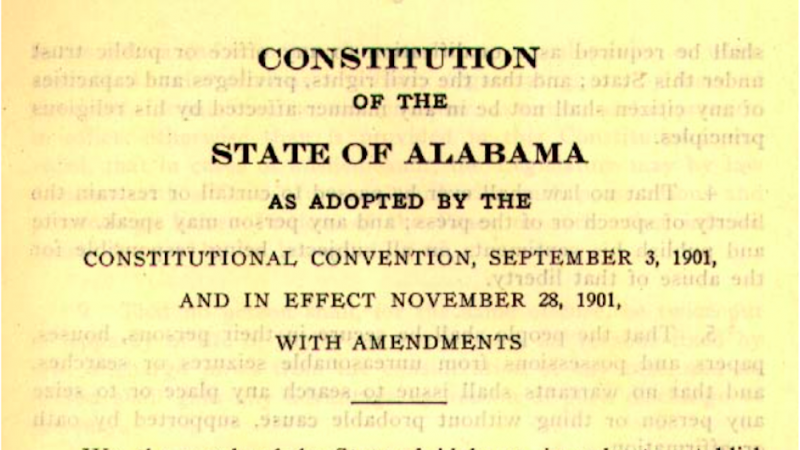Alabama Moves One Step Closer To Removing Racist Language From State Constitution
Alabama voters this year have the opportunity to reorganize the state’s Constitution, as well as remove racist language from the document.
The passage of a statewide ballot measure to purge racist language from the Alabama Constitution marks an important step in what could be a long process.
Amendment 4 passed with almost 67% of the vote in Tuesday’s election. One of six constitutional amendments on the state ballot this November, the measure authorizes lawmakers to recompile the Alabama Constitution and submit it during the 2022 legislative session.
Alabama’s Constitution is the longest in the world. Most of the original language has never been removed — it’s simply been nullified by later amendments or federal court orders. The state constitution still includes language that segregates schools and bans interracial marraige.
Amendment 4 was sponsored by Democratic state Rep. Merika Coleman and co-sponsored by Republican House Speaker Mac McCutcheon. It passed both houses of the Alabama State Legislature unanimously.
Similar amendments in 2004 and 2012 failed to win majority support from Alabama voters. The primary disagreement was over constitutional Amendment 111, which declares that the state does not guarantee “any right to education or training at public expense.” For years, Democratic lawmakers have wanted this language removed, but Republicans feared that such a move would disrupt private education. This year, legislators decided to leave this issue alone, a choice that boosted the amendment’s chances of passage.
“The support of a variety of progressive and even conservative groups on both sides of the spectrum provided some comfort to voters who may have been concerned about changing the state’s constitution,” said Randolph Horn, a Samford political science professor.
It will take years to revise the Alabama Constitution. Amendment 4’s passage was just an initial step in what will be a cumbersome process. The Legislative Reference Service will now draft changes to the state constitution. Those changes will go before the Legislature in 2022. If the legislature approves the proposed changes, voters will then have to vote on the new constitution, perhaps in the 2022 general election.
How could the U.S. strikes in Iran affect the world’s oil supply?
Despite sanctions, Iran is one of the world's major oil producers, with much of its crude exported to China.
Why is the U.S. attacking Iran? Six things to know
The U.S. and Israel launched military strikes in Iran, targeting Khamenei and the Iranian president. "Operation Epic Fury" will be "massive and ongoing," President Trump said Saturday morning.
Sen. Tim Kaine calls on the Senate to vote on the war powers resolution
NPR's Scott Simon talks to Sen. Tim Kaine, D-Va., about the U.S. strikes on Iran.
Iran strikes were launched without approval from Congress, deeply dividing lawmakers
Top lawmakers were notified about the operation shortly before it was launched, but the White House did not seek authorization from Congress to carry out the strikes.
Political science expert weighs in on Iran’s nuclear program in light of U.S. strikes
NPR's Scott Simon speaks to Ariane Tabatabai, the Public Service Fellow at Lawfare, about U.S. attacks on Iran and how President Trump's calls for regime change might be received there.
Week in Politics: Does Trump have political support for his actions in Iran?
We look at what President Trump's decision to attack Iran means, what kind of support he has in Iran and what this moment means for his administration.





